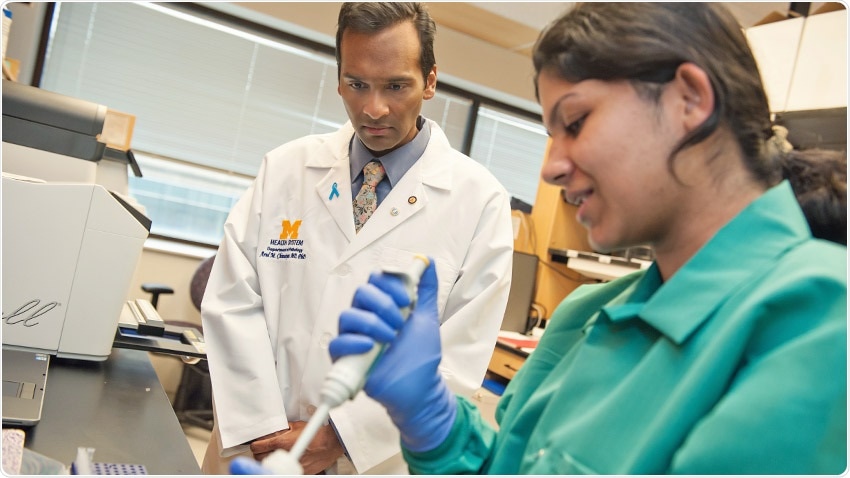Scientists headed by the University of Michigan Rogel Cancer Center converted an immune cold cancer into one that responds to immunotherapy. They started with a simple thread: an inhibitor that exhibited optimism against metastatic castration-resistant prostate cancer cells, a challenging type of prostate cancer—an advanced disease resistant to hormone-based treatment.

The authors discovered ESK981 directly targets PIKfyve, which affects processes involved in metabolism and cell death. Image Credit: Leisa Thompson.
With this key thread, researchers started to unravel many levels of cellular processes that prevented the immune system from mounting a response. Breaking past them with the inhibitor makes a once immune cold tumor red hot.
“Immunotherapy has dramatically improved outcomes for some types of cancer. But prostate cancers are typically immune cold, which means these patients have benefited little from immunotherapies. Finding a way to rev up the immune response would create tremendous opportunity to improve patient outcomes,” states Arul M. Chinnaiyan, MD and Ph.D., and S. P. Hicks.
Arul M. Chinnaiyan is the director of the Michigan Center for Translational Pathology and S.P. Hicks is Professor of Pathology at Michigan Medicine. Chinnaiyan is the study’s senior author. The research outcomes have been published in the Nature Cancer journal.
The scientists screened a library of 167 inhibitors against prostate cancer cells. They identified ESK981, the one with the most impact.
ESK981 belongs to a class of drugs called multi-tyrosine kinase inhibitors, which are designed to hit multiple targets. It acts similar to a combination therapy by blocking cancer on more than one front. It was created to check blood vessel growth and is already tested in phase 1 clinical trials. It has been identified to be safe and well-tolerated.
The scientists found that ESK981 inhibited tumor growth in cell lines and mice with metastatic castration-resistant prostate cancer.
The response was intriguing, but we wanted to understand the mechanism at play with ESK981 in prostate cancer cells.”
Arul M. Chinnaiyan, Study Senior Author and Director, Michigan Center for Translational Pathology
The researchers identified the occurrence of many cellular processes. First was the role of autophagy, a type of cell death. Intriguingly, the researchers discovered that ESK981 was a potent inhibitor of autophagy in tumor cells. This resulted in the cancer cells producing a protein called CXCL10, leading to the recruitment of immune T cells to the tumor.
However, there was another layer to go. Eventually, the researchers tracked it back to PIKfyve, a type of protein called a lipid kinase. They found that ESK981 directly targets PIKfyve, affecting these multiple processes involved in metabolism and cell death.
The scientists demonstrated the knocking down of PIKfyve in mice and cell lines. They discovered the same processes taking place: halt of tumor growth, control of autophagy, and extra T cells recruitment to the tumor. Upon addition of an immune checkpoint inhibitor to the PIKfyve knockdown, the impact was even higher, considerably reducing tumors.
Overcoming resistance to immunotherapy is an urgent need in prostate cancer. PIKfyve is a promising target, especially combined with an immune checkpoint inhibitor. This combination has potential to extend the benefit of immunotherapy to patients whose tumors have previously not responded.”
Arul M. Chinnaiyan, Study Senior Author and Director, Michigan Center for Translational Pathology
On the basis of their results, the scientists have commenced phase 2 clinical trials using ESK981 alone or along with the immunotherapy nivolumab for metastatic castration-resistant prostate cancer.
Source:
Journal reference:
Qiao, Y., et al. (2021) Autophagy inhibition by targeting PIKfyve potentiates response to immune checkpoint blockade in prostate cancer. Nature Cancer. doi.org/10.1038/s43018-021-00237-1.